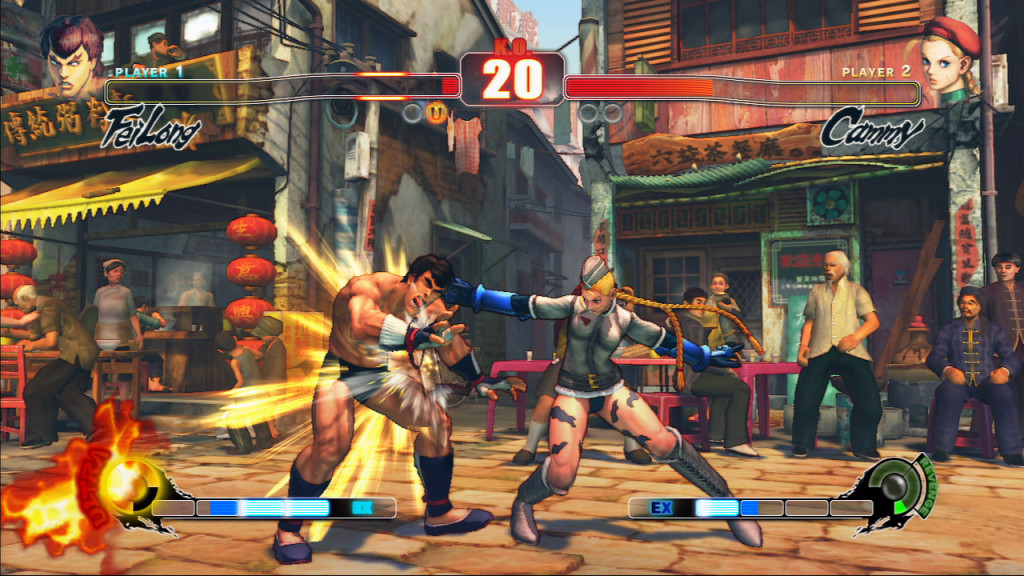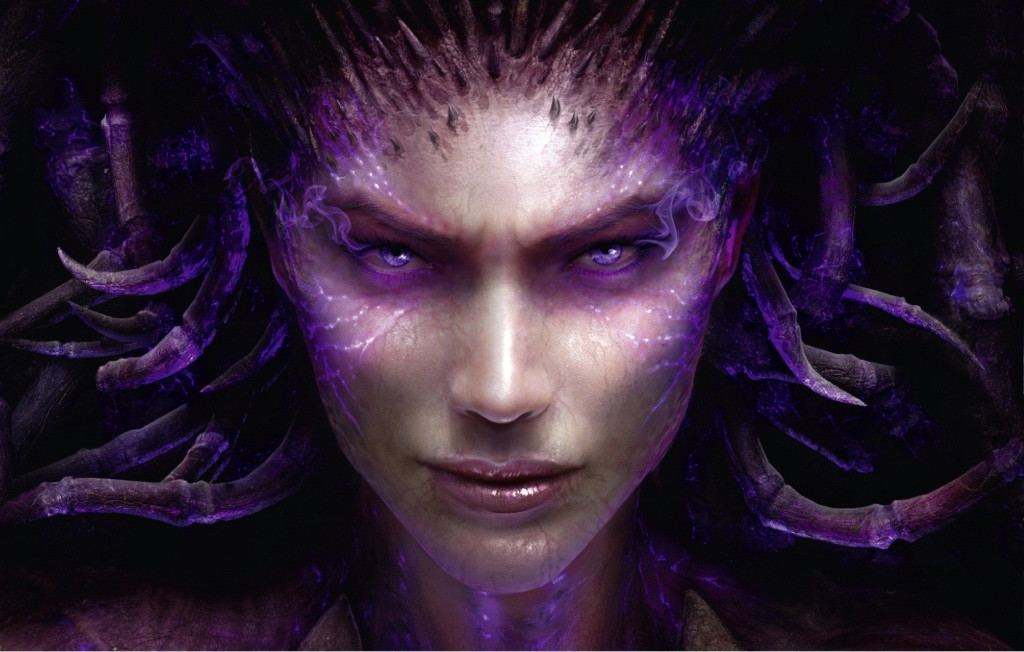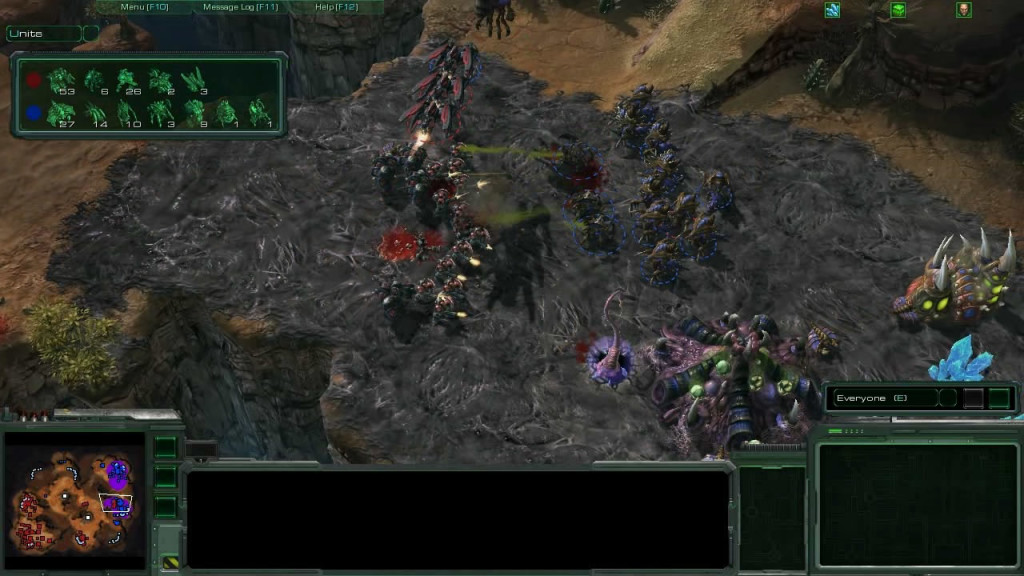Last updated on March 12, 2013
StarCraft II: Heart of the Swarm came out. I didn’t buy it, but not for lack of wanting (more like funds). I’m just not an RTS player at heart.
In sentence, Blizzard makes rather good games in both their single-player and multiplayer aspects. I’ve never been much of a fan of StarCraft, or the whole of the real-time strategy genre in general. Does that mean I don’t like them? Not at all! I played WarCraft III a lot when it first came out, but I just can’t describe myself as competent in any sense. I played the campaign, went into a few multiplayer matches, got absolutely crushed, and went home. Sounds pretty similar to my Warhammer 40K: Dawn of War experience in a nutshell as well.
The macrostrategy always appears nonsensical to me, and there’s so many build orders, counters, and resource management that I never had the time nor the inclination to develop. I can appreciate, however, how well people do play these games. When it comes to competitive multiplayer games, I simply prefer my fighting games. In both cases, I admire the skills of the people involved and see the second-by-second strategies employed; it’s no wonder competitive StarCraft boasts some of the highest spectator numbers of any game in that regard.
Like watching a digital war unfold before your eyes, RTS games provide a great resource for pure spectacle for people like me. A little further down the line, though, you can see and perceive the strategies forming, the control points taken, the styles of the players (offense, defense, etc). Speed and build orders count for a lot. What buildings do I build? Where? What resources do I need, and how do I get them? Describing this in text becomes a fruitless endeavor, as the RTS game boils down to actions per minute (APM). You need high APM to succeed; Blizzard wants this execution requirement as a barrier to entry for the game. The more APM, the faster you react and the faster your opponent(s) cannot. The more APM you perform (and many units in the game do reward such behavior DONE WELL), the more likely you outpace your opposition.
Perhaps that shows you why I, growing up on Japanese games with controllers and pre-defined control schemes, could never quite get into the RTS mold without some hair-pulling frustration.
Execution, though, exists in many competitive games. An FPS may require pinpoint accuracy with a mouse to line up a speedy headshot; a fighting game may require some hilariously obtuse and accurate command to punish mistakes. If you looked at the actual inputs required to perform some of the combos in this King of Fighters XIII video, I guarantee your head would spin around until it spun right off:
The power of muscle memory remains strong in competitive gaming, and it’s for good reason. Execution becomes part of the strategy – what can my opposition DO and NOT DO? At a high level, it’s more about tricking your opponent than anything else, as he/she knows the majority of your possible movements. Can a person perform said strategy/movement in the heat of the moment? Execution does not always aid in strategy (sometimes, it merely exists as a limiter to who can actually play), but ideally it should aid, rather than detract, from the game itself. Strong movements should take more effort, but not so much as to make the game unplayable without pinpoint accuracy – the time required should make strategy more prominent, not your ability to smack a billion keys on a keyboard.
StarCraft requires this, sure, but they’ve designed the game around fast action AND strategy at the same time. You need to foster both skills in order to succeed; that is the designer’s choice. Unlike in a single player game, a complex movement adds to the strategy. Competitive multiplayer games change the whole dynamic of how a designer implements the game’s structure and rules. In StarCraft’s case, the campaign’s merely there to get you familiar with abilities, game structure, and everything else involved in playing effectively.
After that, you’re “on your own”, but there’s a brilliant, and often hidden, dynamic here: the metagame. Many call this the strategy portion; it’s the determination of what tactics ARE the most effectively in any given game rule system. Many seem to believe this isn’t part of the developer’s intent, but that couldn’t be further from the truth. Competitive games come with their own freedom to experiment, but it’s obvious that optimal strategies naturally develop out of those rules. Given enough people playing a particular game, all possible combinations will be found, and the best ones naturally emerge and dominate the field. These elements and strategies don’t exist by default in the game; it takes time and effort to learn them, trial and error to discover them.
Sulla, a competitive League of Legends player (also known in the competitive Civilization community, which sounds rather awesome), has this to say of the metagame:
The League of Legends metagame is a natural outgrowth of the gameplay and design choices made by Riot Games when they set the whole thing up in the first place. The current metagame is the most efficient way in which to allocate limited resources on the game’s default map (Summoner’s Rift). The adoption of standardized roles reflects the growing sophistication of the League of Legends playerbase, as less effective setups are weeded out and proved to be unviable. Rather than railing against the metagame, the players should instead embrace it as the best way to maximize their own chances of success. And indeed, once a player has accepted the framework of the metagame, he or she can counter-pick deliberate “anti-meta” strategies that offer further chances to achieve victory (Talon mid to kill squishy mages, etc.) In the long run, anyone who refuses to accept the dictates of the metagame is essentially relegating themselves to the League of Legends version of the stone age. You aren’t being some kind of bold non-conformist, you’re simply championing your own ignorance.
Many lament the fact that the metagame exists, as it makes said game “less fun”. Other than being quite ambiguous, what’s not fun about playing optimally to the best of your ability and to your greatest advantage? Is winning not fun? That’s the basis of the metagame in any competition – to create the greatest advantage for one’s self and increase your own chances of winning. All developers know this; they craft the game, they analyze the matches, and they make the balance changes and patches. They know what is “overpowered” and what should remain in the game. Of course, you can’t fully balance a game of asymmetrical choices, but you can sure try to the best of your ability by setting the focus of the metagame with your rules. That focus will, in time, determine the viable setups and choices you make, thereby limiting what is effective. Ultimately, understanding the metagame means you can also employ anti-metagame strategies – since everyone follows it, you’ll have a big advantage over the majority of the field. And on and on it goes as the game’s competitive life (if designed well) continues to develop, moving back and forth between various poles.

Of course, this all assumes that the metagame of a stellar, well-designed experience like StarCraft II…which, at times, it is not. The metagame depends on the game’s inherent mechanics – it doesn’t mean that the game doesn’t retain optimal strategies, but when matchups (i.e., how many matches out of ten will this setup win) start looking like 9-1 in the former’s favor, then there’s a problem with the core of design. When one strategy, movement, or character simply dominates everything, it’s not very competitive, is it? I would call it an inherent problem with the design of asymmetrical design, but that same structure gives variety. As Sirlin notes of collectible card games and their tendency to have dominating decks:
You could make that same argument about decks in Magic: the Gathering. I think this is an illusion, and I was caught in it for years because it’s kind of “conventional wisdom” and never even really questioned or talked about. I only really started to realize why this doesn’t add up when I was working on my own customizable card game.A “rich metagame” means there are lots of decks that counter other decks, and you get to sit around thinking about which deck will be common at a tournament and which you should choose in response. For example, if you discovered an unusual deck that could win 9-1 against the most of the field and lose 1-9 against part of the field, that could be a very, very strong deck. This is metagaming at its finest, yet it also leads to 100% of your games having terrible gameplay.
And there’s the rub. The kind of metagame under discussion is one where global imbalance is assumed to be “good.” The assumption is that sitting down to play another player and having a advantage or disadvantage before the game even starts is a great thing. Well, it kind of sucks actually, and violates the concepts of basic fairness. You could define “the game” to be the larger thing that involves “picking a deck/character + playing it” but that’s hardly an answer. It’s just admitting that the part where you actually play is kind of sucky and unfair.
True enough!
So why all this background? Well, to put it simply: the metagame IS the game. Without it, it doesn’t exist. That might seem weird or simplistic given the complications listed above, but the metagame doesn’t exist in your head; it exists in the actual game itself, just waiting for discovery. That the “metagame” determines what’s viable doesn’t mean someone could completely change said metagame in an instant with an unknown technique – it’s happened before, and will happen again. No one can predict where it will go, or what will become better or worse (especially with patches), but you can still keep playing to find out new, tiny, infinitessimal information that ekes out a victory. That’s part of the game and its design, so accept it. Why should the metagame prevent you from playing?
This happens ALL the time. People complain about the competitive nature of these games – their need for optimal play – and say “where’s the freedom to play where I want and how I want?” Well, it’s in casual games using the exact same game! But if you want to be competitive, you can’t go into the play with that mindset; it’s like expecting modern English out of Shakespeare. If you want to play for real, you need to adapt and learn; you can’t just pontificate and vacillate all day.If you let the metagame dominate you, then you’ve already lost. Accept it, but also take note of it and determine your style around it. If you constantly complain about it, you cannot defeat it or overcome it. It is an overbearing focus on the metagame, and complaining/debating/resigning about what cannot be changed which puts people into the hole.
It is a matter of the heart versus a matter of the intellect; action versus words. Faith without works is dead. Total focus on metagame destroys the real game. Focusing on solely what you believe about something destroys the very thing you believe. So it is in video games, so it is in real life. It’s difficult to succeed or have fun when you work against that very definition of success.
14 What use is it, my brethren, if someone says he has faith but he has no works? Can that faith save him? 15 If a brother or sister is without clothing and in need of daily food, 16 and one of you says to them, “Go in peace, be warmed and be filled,” and yet you do not give them what is necessary for their body, what use is that? 17 Even so faith, if it has no works, is dead, being by itself.
18 But someone may well say, “You have faith and I have works; show me your faith without the works, and I willshow you my faith by my works.” 19 You believe that God is one. You do well; the demons also believe, and shudder.20 But are you willing to recognize, you foolish fellow, that faith without works is useless? 21 Was not Abraham our father justified by works when he offered up Isaac his son on the altar? 22 You see that faith was working with his works, and as a result of the works, faith was perfected; 23 and the Scripture was fulfilled which says, “And Abraham believed God, and it was reckoned to him as righteousness,” and he was called the friend of God. 24 You see that a man is justified by works and not by faith alone. 25 In the same way, was not Rahab the harlot also justified by works when she received the messengers and sent them out by another way? 26 For just as the body without the spirit is dead, so also faith without works is dead.
– James 2


